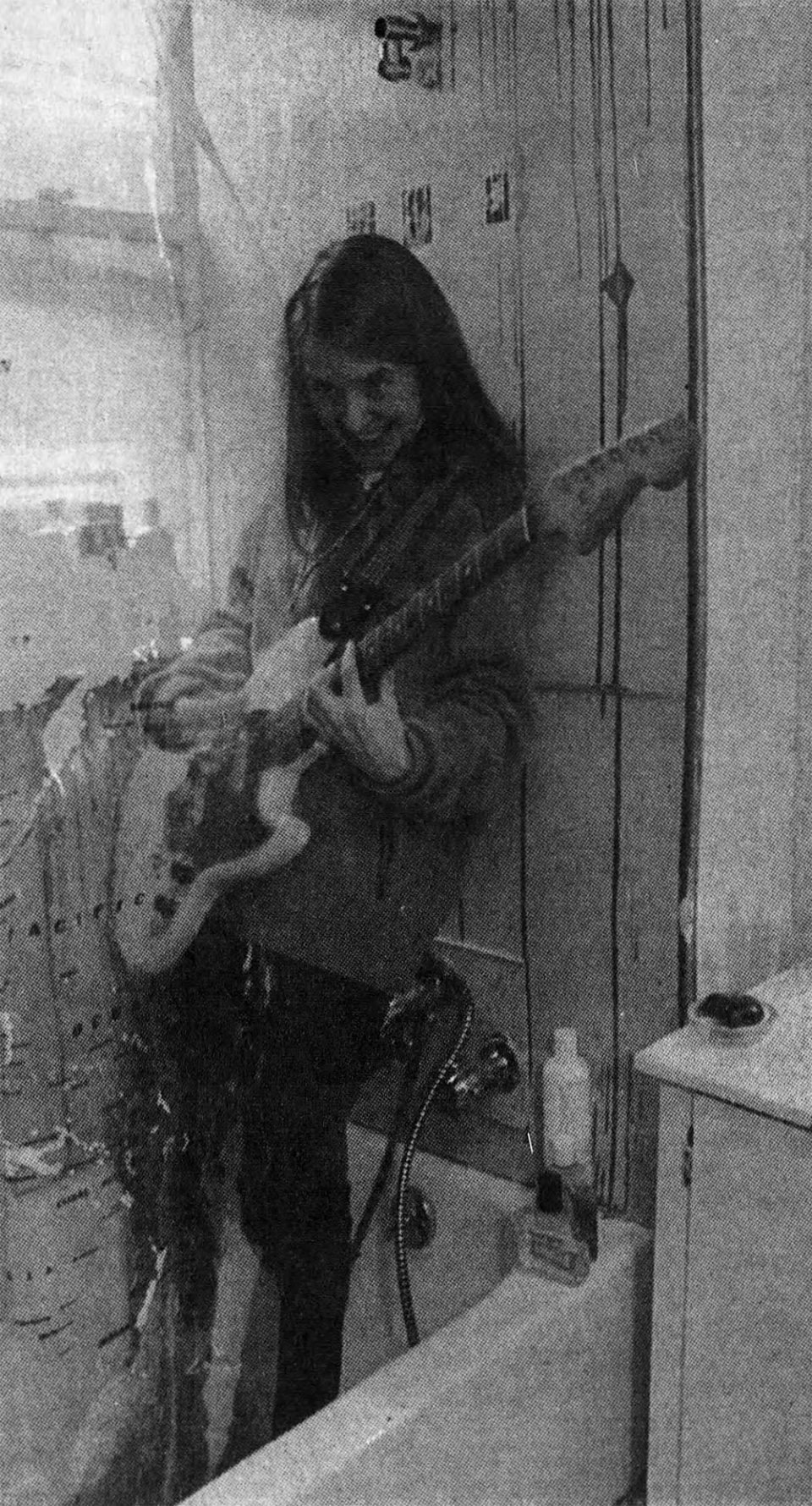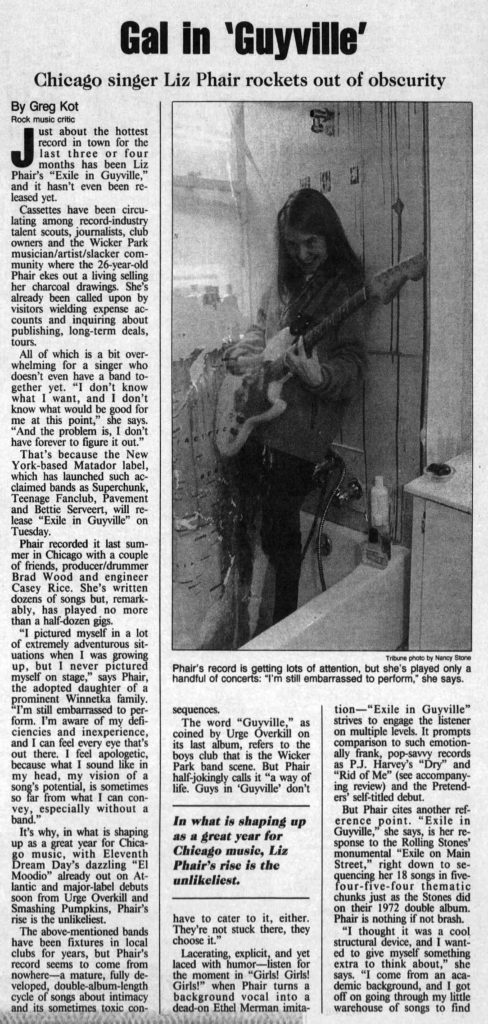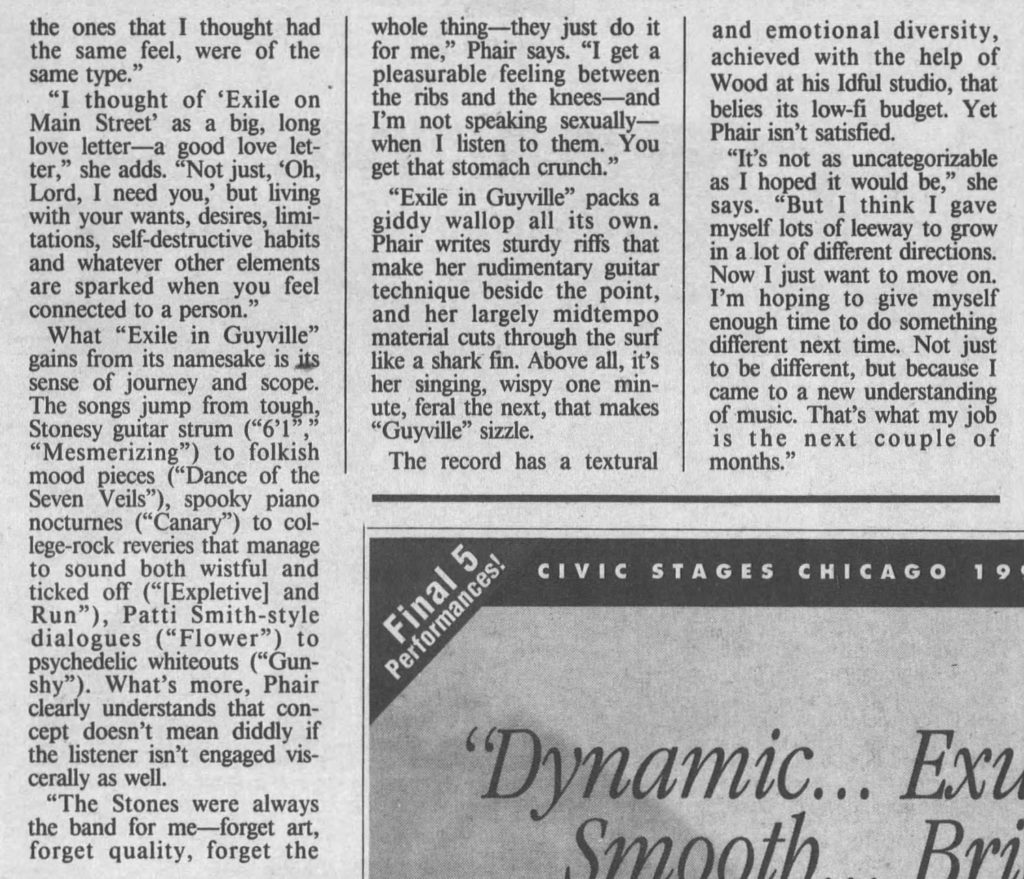Just about the hottest record in town for the last three or four months has been Liz Phair’s Exile in Guyville, and it hasn’t even been released yet.
Cassettes have been circulating among record-industry talent scouts, journalists, club owners and the Wicker Park musician/artist/slacker community where the 26-year-old Phair ekes out a living selling her charcoal drawings. She’s already been called upon by visitors wielding expense accounts and inquiring about publishing, long-term deals, tours.
All of which is a bit overwhelming for a singer who doesn’t even have a band together yet. “I don’t know what I want, and I don’t know what would be good for me at this point,” she says. “And the problem is, I don’t have forever to figure it out.”
That’s because the New York-based Matador label, which has launched such acclaimed bands as Superchunk, Teenage Fanclub, Pavement and Bettie Serveert, will release Exile in Guyville on Tuesday.
Phair recorded it last summer in Chicago with a couple of friends, producer/drummer Brad Wood and engineer Casey Rice. She’s written dozens of songs but, remarkably, has played no more than a half-dozen gigs.
“I pictured myself in a lot of extremely adventurous situations when I was growing up, but I never pictured myself on stage,” says Phair, the adopted daughter of a prominent Winnetka family. “I’m still embarrassed to perform. I’m aware of my deficiencies and inexperience, and I can feel every eye that’s out there. I feel apologetic because what I sound like in my head, my vision of a song’s potential, is sometimes so far from what I can convey, especially without a band.”
It’s why, in what is shaping up as a great year for Chicago music, with Eleventh Dream Day’s dazzling El Moodio already out on Atlantic and major-label debuts soon from Urge Overkill and Smashing Pumpkins, Phair’s rise is the unlikeliest.
The above-mentioned bands have been fixtures in local clubs for years, but Phair’s record seems to come from nowhere — a mature, fully developed, double-length cycle of songs about intimacy and its sometimes toxic consequences.
The word “Guyville”, as coined by Urge Overkill on its last album, refers to the boys club that is the Wicker Park band scene. But Phair half-jokingly calls it “a way of life. Guys in ‘Guyville’ don’t have to cater to it, either. They’re not stuck there, they choose it.
In what is shaping up as a great year for Chicago music, Liz Phair’s rise is the unlikeliest.
Greg Kot, Chicago Tribune (May 2, 1993)
Lacerating, explicit, and yet laced with humor — listen for the moment in “Girls! Girls! Girls!” when Phair turns a background vocal into a dead-on Ethel Merman imitation — Exile in Guyville strives to engage the listener on multiple levels. It prompts comparison to such emotionally frank, pop-savvy records as P.J. Harvey’s Dry and Rid of Me (see accompanying review) and the Pretenders’ self-titled debut.
But Phair cites another reference point. Exile in Guyville, she says, is her response to the Rolling Stones’ monumental Exile on Main Street, right down to sequencing her 18 songs in five-four-five-four thematic chunks just as the Stones did on their 1972 double album. Phair is nothing if not brash.
“I thought it was a cool structural device, and I wanted to give myself something extra to think about,” she says. “I come from an academic background, and I got off on going through my little warehouse of songs to find the ones that I thought had the same feel, were of the same type.”
“I thought of Exile on Main Street as a big, long love letter — a good love letter,” she adds. “Not just, ‘Oh, Lord, I need you,’ but living with your wants, desires, limitations, self-destructive habits and whatever other elements are sparked when you feel connected to a person.”
What Exile in Guyville gains from its namesake is its sense of journey and scope. The songs jump from tough, Stonesy guitar strum (“6’1″”, “Mesmerizing”) to folkish mood pieces (“Dance of the Seven Veils”), spooky piano nocturnes (“Canary”) to college-rock reveries that manage to sound both wistful and ticked off (“Fuck and Run”), Patti Smith-style dialogues (“Flower”) to psychedelic whiteouts (“Gunshy”). What’s more, Phair clearly understands that concept doesn’t mean diddly if the listener isn’t engaged viscerally as well.
“The Stones were always the band for me — forget art, forget quality, forget the whole thing — they just do it for me,” Phair says. “I get a pleasurable feeling between the ribs and the knees — and I’m not speaking sexually — when I listen to them. You get that stomach crunch.”
Exile in Guyville packs a giddy wallop all its own. Phair writes sturdy riffs that make her rudimentary guitar technique beside the point, and her largely midtempo material cuts through the surf like a shark fin. Above all, it’s her singing, wispy one minute, feral the next, that makes Guyville sizzle.
The record has a textural and emotional diversity, achieved with the help of Wood at his Idful studio, that belies its low-fi budget. Yet Phair isn’t satisfied.
“It’s not as uncategorizable as I hoped it would be,” she says. “But I think I gave myself lots of leeway to grow in a lot of different directions. Now I just want to move on. I’m hoping to give myself enough time to do something different next time. Not just to be different, but because I came to a new understanding of music. That’s what my job is the next couple of months.”
By Greg Kot
Chicago Tribune, May 2, 1993








